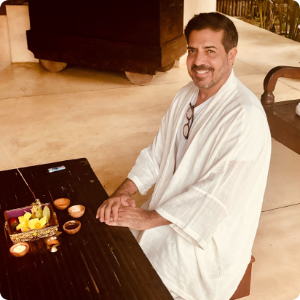Radical Responsibility in Action
Jan 08, 2025
As we embrace this idea of Radical Responsibility – the notion that our lives are ours to choose and no one else is going to change the circumstances in our lives – it raises some important questions.
How do we actually affect that?
What do we look for in our language?
What do we look for in our conversations that might point to areas in our lives where we might not be taking responsibility?
And how do we create that awareness?
Well, here are a couple of pointers:
First, anytime we start to use excuses, reasons, blaming a situation or a person, we can usually be tipped off.
That's a telltale sign that we are not taking responsibility in that particular situation. Now, I'm not only talking about grand, huge areas of life. Certainly it's true for those, but it's also particularly true for the little areas of life, that the moments where we can be “killed with a thousand razors,” like explaining away being late for an appointment because of traffic.
There are all kinds of excuses and reasons we're giving versus taking full responsibility. No matter how good we get at this, it's kind of instinctual to immediately want to find some reason and some excuse. In small ways and in large ways, we take on this stance of victimhood.
If you’re someone who does a lot of self-inquiry, you likely don't view yourself in any sense as a victim in life. But at the same time, there are these micro moments where we unconsciously play that victim card. And I think it's important to have a really acute attention and awareness on that, because that can really define these small interchanges, these small interactions, which ultimately build a life.
Next, I believe the word “because” is a telltale sign.
The word “because” leads to some kind of excuse or reason. It's hard to use the word without the intention of providing an excuse or reason. So look out for that word in your speech, in your language, in your emails, in your texting, etc.
And so by doing that, we then shift from the word because – from being a victim, from having excuses – to being cause.
We are taking on the agency of our own actions. Everything rests with us. The buck stops with us.
Let's also remember that there's some reason why we created those reasons.
There's something we're gaining by being a victim.
And the only time that we're going to change is when the benefit that we get from the behavior is not worth this price that we're paying in whatever it is.
But the first thing we must bring into our awareness is this hidden upside that we're deriving from our behavior or this way of thinking. There's some kind of upside or some kind of payoff. And it's not always self-evident.
So that leads to this idea of a deeper listening.
In our everyday experience, we tend to adapt very easily to everything around us. Martin Heidegger, the philosopher, had this wonderful concept of “tranquilized obviousness,” wherein certain things – when they're new – are interesting, and we take notice. But over time, the human capacity for adaptation takes over and things that are novel one day are taken for granted the next.
And there is an evolutionary benefit to that. Human beings can adapt very rapidly to adverse conditions. But there's also this other side to it, which is that we tend to stop seeing what's around us in any new way of wonder.
Wonder dissolves over time. And when we're talking about bringing more attention and listening to life moments, this is what we're talking about: Can we start to experience everything around us as if it was the first time again? Hearing versus listening, passive versus active.
How can we start to experience everything around us with all our senses? Experiencing everything around us, listening to the moment with our full bodies, with body language and tone. Really starting to see, hear everything in much finer detail.
And of course, music is our training ground for this. The benefits include creating greater understanding and discovering things that could be right next to us, discovering people again that we take for granted, discovering parts of ourselves.
This is what comes from a deeper listening.
Are you ready to discover deeper listening for yourself? Where will you begin?


